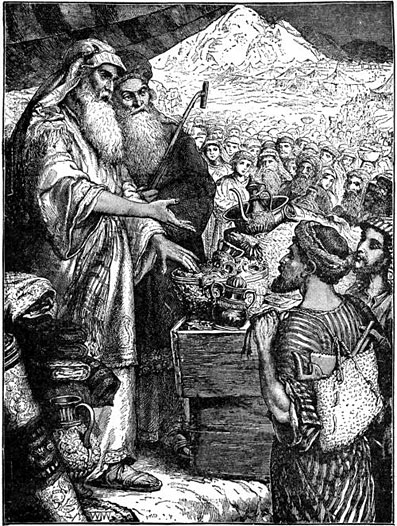Sep
16
2009

or Why Four Horsemen but Seven Seals?
“…the Egyptians are men, and not God; And their horses are flesh, and not spirit.” Isaiah 31:3
One of the three laws for Israelite kings was a command against multiplying horses and chariots—especially Egyptian ones. Solomon’s horse trading was, for a nation with a miraculous escape ON FOOT, in the eyes of the Lord, just like the faithless behaviour of the Hebrews in the wilderness. It’s always better to dwell in a tent with God than in a palace with the devil. Solomon’s kingdom of chariots and oppression became a new Egypt. By the end of the era, the pigs ruled the farm.
Continue reading
Comments Off | tags: Chariots, David, Egypt, Four Horsemen, Isaiah, Lampstand, Psalms, Solomon, Zechariah | posted in Biblical Theology, The Last Days, The Restoration Era
Sep
7
2009
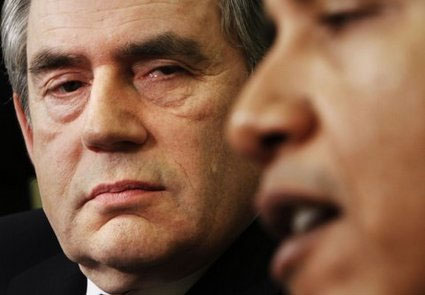
Solomon Snubs Ally with Trashy Gift
When I was in sales, I was taught that it takes twelve times as much energy to gain a new client as it does to keep an existing one by letting them know they are not taken for granted. Same goes in geopolitics.
James Jordan writes:
One way to understand the relevance of Egypt [during Solomon's reign] is to contrast Egypt with Tyre. Hiram, king of Tyre, had been a loyal ally of David. He loved David. He clearly was a converted man. When Solomon came to the throne, Hiram could not do enough for him. He volunteered to help build the Temple, because Israel’s God was his God also (1 Kings 5). He showered Solomon with gifts (1 Kings 9:11, 14). If there was any nation Solomon should have allied with, it was Tyre.
Continue reading
Comments Off | tags: Bible history, Egypt, James Jordan, Obama, Politics, Solomon, Tyre | posted in Biblical Theology, Quotes
Aug
7
2009
or Having No Controversies With God
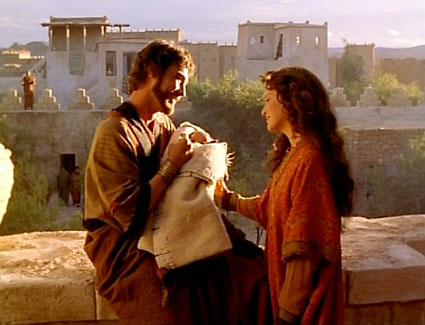
The devil hates confession. It breaks his power over us. He would rather have us confine ourselves behind the bars of our own private Sheols than get right with God.
Why is confession so powerful? Because it is judicial. It is an application of the knowledge of good and evil. Continue reading
6 comments | tags: Bathsheba, David, Feasts, James Jordan, Nathan, Peter Leithart, Saul, Solomon, Systematic typology | posted in Biblical Theology, Christian Life, Quotes, Totus Christus
Jul
27
2009
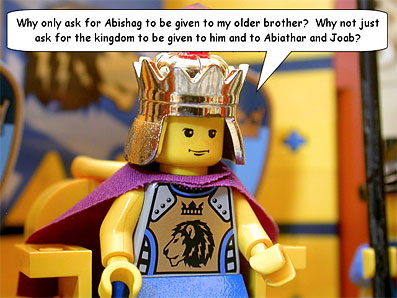
Eli’s corrupt priesthood came to an end when the Ark was taken by the Philistines. Saul’s corrupt kingdom came to a full end when the Ark returned (hence Michal’s barrenness). The last of Eli’s priesthood (Abiathar) was exiled when Solomon’s government began. Solomon’s kingdom was a new firmament (1 Kings 10:19). Isaiah, however, saw it being rolled up like a scroll (Is. 34:4).
Continue reading
Comments Off | tags: Abiathar, AD70, Ark of the Covenant, Caiaphas, Cyrus, David, Eli, Feasts, High Priest, Literary Structure, Saul, Solomon, Systematic typology, Zechariah | posted in Biblical Theology, The Last Days
Jul
25
2009
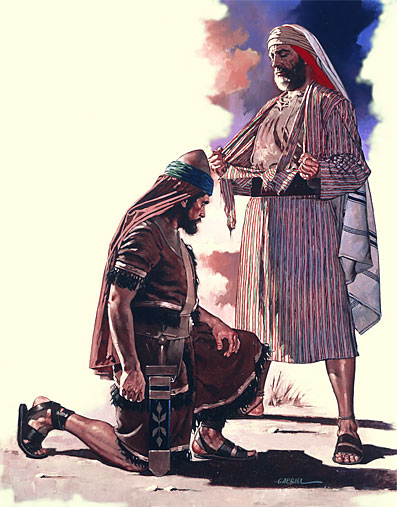
or Worship-styles of the Bitter and Twisted
Under Rehoboam, Solomon’s kingdom became even more like Egypt. Solomon had imposed greater taxes upon his people than were appropriate, and his son Rehoboam took this to the extreme. So the Lord brought about a new Exodus, with Jeroboam as a kind of Moses. David felt guilty for cutting the corner off Saul’s robe — ie. grasping at Saul’s symbol of office — but to Jeroboam the prophet gave ten of the twelve pieces of his robe, the ten northern tribes.
Continue reading
Comments Off | tags: Aaron, David, Egypt, Golden, Jeroboam, Moses, Saul, Solomon | posted in Biblical Theology, Christian Life
Jul
18
2009
or The Holy Voodoo Doll
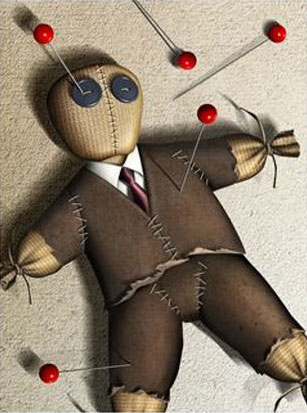
The Lord’s plan from the beginning has been to take each man through three stages of development before transfiguration. The first is to give him access to the Tree of Life (bread) and test his obedience as a priest. Adam failed this test. The second is to give him access to the Tree of the Knowledge of Good and Evil (wine) and test his wisdom as a king. Solomon failed this test. The third is to give him access to and membership of God’s council of elders as a decision maker, one whose words in and of themselves change history. This is testing as a Prophet, one who has been willing to be broken bread and poured out wine, and whose final years are spent giving wise words to the next generation.[1] The Old Covenant prophets passed this test.
Continue reading
1 comment | tags: Abortion, Judas, Liturgy, Pentecost, Solomon, The Prophets | posted in Biblical Theology, Ethics
Jul
14
2009
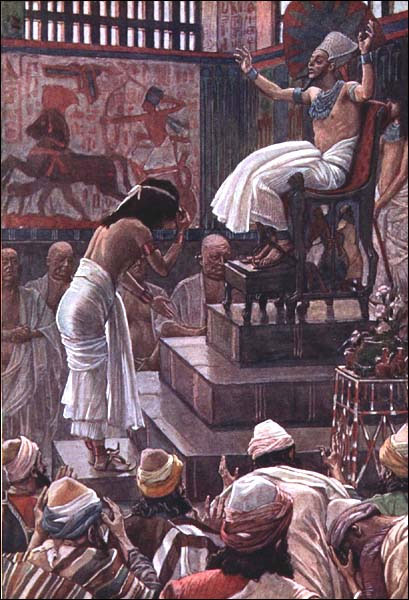
or Theonomy in the Bible
“…instead of Moses and Aaron challenging the powers that be, we have Herodian preachers crying “Peace, peace” when there is no peace. Nathan is not qualified to confront David because Nathan himself has been sleeping around.”
In his post Christianity as Comprehensive Cultural Tribunal?, timsmartt questions the validity of philosophy’s self-appointed role as an unbiased cultural referee and wonders whether Christianity should take that role:
Continue reading
Comments Off | tags: Aaron, Abraham, Against Hyperpreterism, antichrist, Daniel, Esther, Herod, Jethro, John the Baptist, Korah, Melchizedek, Mordecai, Moses, Nathan, Philosophy, Postmillennialism, Solomon | posted in Biblical Theology, The Last Days, The Restoration Era
Jul
3
2009
“Be meticulous to present yourself for the praise of God as an unashamed workman, cutting the word of truth in a straight line.” (II Timothy 2:15)
Is this verse simply teaching that if we “divide up” the Scriptures correctly, we’ll get an AWANA[1] merit badge from God? Hardly. It is flanked by condemnations of those who fight over the Scriptures to no profit, and those whose vain babblings are gangrenous.
Paul speaks of a soldier and a farmer, and then a productive workman. Paul is concerned about building saints and churches, and they are built by a straight and true cutting of the word. Like most of Paul’s statements, there is a very long, fully-loaded freight train of Old Testament history and typology right behind it, and it’s coming right at you, right now.
Continue reading
Comments Off | tags: Darius, David, Esther, Ezekiel's Temple, Nebuchadnezzar, New Jerusalem, oikoumene, Peter, Peter Leithart, Postmillennialism, Revelation, Solomon, Stigmata, Temple, Totus Christus, Worship | posted in Biblical Theology, Christian Life, The Last Days, The Restoration Era
Jun
7
2009
A couple of brave readers of my book Totus Christus have pointed out an apparent discrepancy in my ordering of the above three roles. One kindly writes:
The only question of substance I have for you concerns the prophet, priest and king flow of OT history. It may be that you disagree with Jim, but he’s quite insistent that the proper order is priest, king, prophet. He discusses this in From Bread to Wine, p. 9-15. In any case, it might be helpful to explain why you deviate…
Continue reading
Comments Off | tags: Aaron, David, Dominion Theology, High Priest, James Jordan, Moses, Music, Solomon | posted in Biblical Theology, Totus Christus
May
30
2009
A House of Bread
There are two kinds of whiteness in the Bible, and an understanding of this explains a great deal. There is the whiteness of covering and the whiteness of uncovering. And, as mentioned, the Bible makes a great deal out of the concept of covering.
Bone Collector
Purge me with hyssop, and I shall be clean; Wash me, and I shall be whiter than snow.
Touching a corpse made an Israelite unclean. The remains of those slain in battle were marked with lime for two reasons: so that they could be avoided by the clean, and so they could be gathered up and burned to lime by the bone collectors. Jesus said that the righteousness of the Pharisees was like a whitewashed sepulchre. Not only were they full of the ceremonial uncleanness of broken Covenant, their so-called righteousness was actually a mark from God upon them. They would be gathered to their people not by the Father sending His angels to the four corners of the Land, but by the father of lies and his scavengers sent by God to clean the wound.
This image goes right back to Genesis. Like the angels, the Covenant scavengers, though demonic, are also God’s servants. They are the raven of Noah surviving on floating corpses until the water goes down; they are the scavenging dogs that lick up Jezebel’s blood; they are the maggots in misused manna and abandoned grapes (false bread and wine); they are the unclean birds and animals that screech and howl inside the corpse of a defeated Babylon; they are worms inside Herod ‘enthroned’ as a human Gehenna.
The whiteness of the Pharisees was the whiteness of Miriam’s and Gehazi’s skin-plague. It is the whiteness of flesh and bones exposed as unclean to the eyes of God. Satan himself appeared as an angel of light, but like the Pharisees, he was a false lightbearer, a tutor guiding his children the wrong way.
Continue reading
Comments Off | tags: antichrist, Boaz, Egypt, Ezra, Herod, Jezebel, Lampstand, Laodicea, Leviticus, Manna, millstone, Pergamum, Pharaoh, Pharisees, Priesthood, Rahab, Resurrection, Revelation, Ruth, Samson, Scavengers, Solomon | posted in Biblical Theology, The Last Days, The Restoration Era








